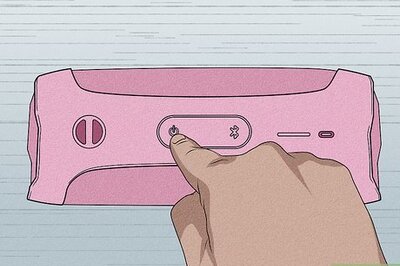
views
Taking Time and Space Away From Negative People

Limit or cut off your communication with negative people. Start by restricting your contact to the negative people in your life. Though you may not want to cut them out of your life altogether, you should make a conscious effort to spend less time with them and reduce your contact with them. This could mean waiting a day or two to respond to their text messages or emails, or not texting them back right away. Inserting some breathing room could let the person know that you are not available at all times and that you need space. If the person starts to notice you are not devoting as much time and energy to them as you used to, and gets upset, you may need to briefly let them know why this is occurring. You may send them a text or email that explains you are trying to spend more time on your needs and wants, and that you need some space from them. You may also have an in-person conversation where you briefly outline why you feel the person is a negative influence and why this bothers you. Try to keep the discussion short and honest, but avoid blaming the person for your decision. Use “I” statements, such as “I feel we need some space and time apart. I feel like you bring negative energy to my life and I am trying to be more positive.”

Create time for you, away from negative people. Sometimes, you end up in a situation where you are forced to work closely or interact on a daily basis with a negative person, such as a family member or a coworker. To counteract their negativity, you should try to carve out some time for you, or "me time". This could be setting aside a portion of the day where you limit or shut off your communication with the person by turning off your phone or not checking your email. You may also inform the person that you are limiting your contact with them to give yourself some alone time, where you can focus on your priorities and goals. You may also create "me time" by taking an after hours class where you are able to pursue an activity or hobby that helps you de-stress. This could be a yoga class, a painting class, or even a book club. Another option is to carve out "me time" by taking one hour a day to be alone, doing a calming, quiet activity like reading, taking a walk, or having a bath. This could give you the space you need to focus on positivity and not get overwhelmed by the negative person.

Confront negative people with positivity. You may also encounter negative people on a day to day basis, from someone who yells something rude at the grocery store to an acquaintance who gets upset for a small, seemingly insignificant reason. Respond to these individuals with positivity, rather than negativity. This will get you into the habit of focusing on the positive in a situation and working actively against negative influences. For example, maybe someone starts to argue with you about cutting in line at the coffee shop. You may then take a deep breath and say, “You know what, I am not in a rush. You can go ahead of me. I would rather avoid an argument with you and stay positive.” You may also have a negative friend who is always complaining about her job. You may tell her, “I think you may want to consider looking for a new job. You do not seem happy there and you are so negative about it. I think you need to make a change to stay positive.”

Seek out more positive friends and acquaintances. You may want to actively look for friends and acquaintances that seem to embrace positivity and shun negativity. Being around people who are positive will only help you to maintain a positive attitude and get rid of any negativity in your life. You may look for more positive friends at work or at school. You may also focus on building relationships with family members who have always been positive and open around you, rather than family who are closed off and negative.
Identifying Negative People in Your Life

Think about people who soak up all your time and energy. Many negative people have a tendency to be time and energy sucks, where they feel their needs and wants are more important than yours. While it is important that you share and listen to everyone’s experiences, relationships are about give and take. You should feel that you have enough space in the relationship for your own time and your own needs. Otherwise, it is likely a negative relationship that needs to be addressed. You may have family members who only contact you when they want to discuss their issues and problems, or friends who spend all their time with you complaining about their life. You may also have people in your life who use all of your shared time to work on their projects and goals, without considering your goals or needs. These are telltale signs of negativity that you need to work to remove from your life. If you have a friend or family member who only tends to contact you only when he or she wants to complain or get help with something, try saying something like, "I care about you and I am happy to help you when I can, but I feel like I don't get a chance to share my problems/goals when we talk." Or, you could also try changing the subject by saying something like, "That sucks! Something really frustrating happened to me today too. Do you want to know what happened?"

Identify individuals who are highly critical towards you. You may have negative people in your life who are always criticizing your appearance, your actions, and your goals. They may tell you that you are “always doing everything wrong” or that “you just don’t get it.” They may also insult you and pick on you, reminding you that you are “too dumb to do anything right” or make negative comments about your physique and your lifestyle. Keep in mind constructive criticism that helps you grow as an individual can be useful. Constructive criticism should also begin with a focus on the positives of what you are doing and then an open, friendly discussion on where you can improve. You may get constructive criticism from a peer, your boss, or even a friend. This type of criticism can be healthy and helpful, unlike negative criticism, which is often done to shame or embarrass someone. Try saying something like, "I appreciate your feedback when it is constructive, but I feel upset when you criticize me for things that I can't control. I would really like it if you tried not to do that so much."

Note people who get angry at you often. Negative people also tend to have a short temper and may get angry or upset at you often. You may find yourself always having to defend your actions and decisions to the person. You may also have to often try to calm down the person or tell them not to take out their anger on you. The negative person's anger may feel unreasonable or irrational. They may snap over the smallest issues and take their anger out on you. You may find yourself always on the defensive around them and struggling to calm them down on a consistent basis. If there is someone in your life who frequently gets angry at you, try saying something like, "You are entitled to your emotions, but I feel upset when you take your anger out on me. I would appreciate it if you could find a different way to deal with your anger." If you are in a situation where someone is threatening you or you feel threatened, then get away from the person.

Consider any individuals who always have a negative perspective on things. Many negative people have a difficult time focusing on the positive and will often only entertain worst-case scenarios. They may always only view things in a negative light and see the world as gray and miserable. It can be a challenge to maintain a positive attitude when you are surrounded by people who only view things negatively and doomed to fail. Their negative perspective may also cloud their judgment so they are not able to see the potential in a situation. Possibly positive things, like a job offer or a big prize, do nothing to brighten their mood and they often view positive things suspiciously, as they are afraid they may not work out and end up being disappointed. If you often encounter a negative perspective from someone, try saying something like, "I know that there are different ways to look at things, but I feel frustrated when you point out the negative side of things. What are the positives of this situation?"

Think about people who lie to you and are dishonest. Dishonesty can be another source of negativity in your life, and negative people may lie often or manipulate others. You may have family who are always making up stories and lying about their past or friends who try to manipulate a situation for their own benefit or gain. These sources of negativity can make it hard for you to maintain a positive attitude. If there is someone in your life who frequently lies to you, try saying something like, "Honesty is important to me. Please tell me the truth."

Note individuals who bother you or tease you often. Negative people can also come in the form of people who tease you, bother you, or hit on you inappropriately on a consistent basis. You may notice these "pick up artists" are starting to infect your life with negativity, discomfort, and maybe even anger or frustration. Though some people do not mean to be negative or annoying when they tease or bother you, you may start to feel like you are being taunted or talked to in inappropriate and negative ways. If there is someone in your life who teases you, try saying something like, "You may not mean anything by it, but it really bothers me when you say things like that. I would appreciate it if you stopped." Another option is to simply walk away from someone who is teasing you or being inappropriate.

Identify individuals who blame others for their issues. Accountability and responsibility are two elements that many negative people tend to try to avoid or ignore. These individuals may blame their own mistakes on others or avoid taking responsibility for their actions. They may also justify bad life choices or decisions based on the negative actions of others or on their inability to control their actions. This type of negativity can be difficult to be around and may make it hard for you to also be accountable and responsible for your day to day actions. For people who blame you or others for their problems, try saying something like, "I am sorry you feel that way. Do you think there is anything that you could have done to change the situation?"
Creating Your Own Sense of Positivity

Do self care. Taking care of yourself and your needs can help you cultivate a sense of positivity in your life. Make sure you set time aside every week to focus on yourself. You could use this time to do something you enjoy, like playing guitar or drawing. Or you could use this time to pamper yourself by taking a bath, getting a massage, or giving yourself a manicure. Self-care can also come in the form of reading a book or watching your favorite movie. Actions that allow you to enjoy yourself on your own can contribute to your sense of wellbeing.

Focus on a hobby or activity you enjoy. You can also focus on a favorite hobby or activity and set aside time in your week to devote yourself to it. This could be woodworking, knitting, or painting. You may also use exercise as a positive activity in your life, like running, yoga, or playing a sport. Having a hobby or activity you can do on a weekly basis can also be useful for fighting off negativity and feelings of anger, hurt, depression, or sadness. Channel these emotions into your favorite hobby or activity and use them to create something powerful or uplifting.

Maintain a balanced lifestyle. Another way you can foster positivity in your life is by taking actions towards balance and health.This means maintaining a healthy diet, exercising, and getting enough sleep. You should make sure you are eating right every day, with balanced meals and lots of water. You should also do at least 30 minutes of exercise a day, from a brisk walk to an exercise class. Going to bed and waking up at the same time every day can also help you to cultivate a more positive attitude. Getting enough rest will allow you to function at your best and tackle every challenge with motivation and enthusiasm.

Use positive affirmations. If you struggle to maintain a positive attitude day to day, you may want to start your day by saying at least five to ten positive affirmations out loud to yourself. Positive affirmations are all about focusing on "you are what you think" and allow you to vocalize positive thoughts and manifest them throughout your day. They are known to be effective methods of self-improvement as they raise your level of feel-good hormones and encourage positive thinking. Always phrase your affirmations with "I can", "I will", or "I am." For example: "Today, I am full of energy and excited for my day." " I slay; I am indestructible." "I can smile and be happy with my choices." "I will learn a new skill and achieve my goals."

Replace negative habits with positive habits. If you notice you are starting to slide back into your negative habits and your relationships with negative people, check yourself. Then, try to replace the negative with positive actions. This could be not responding to a negative friend or declining an invitation to spend time with a negative relative or coworker. You may also put down junk food and unhealthy foods and try to replace them with healthier options. If you have let your exercise plan slip or your sleep schedule falls apart, try to work to get them back to healthy levels. Shifting these habits will ensure you are focused on the positive and able to stay motivated throughout your day.


















Comments
0 comment